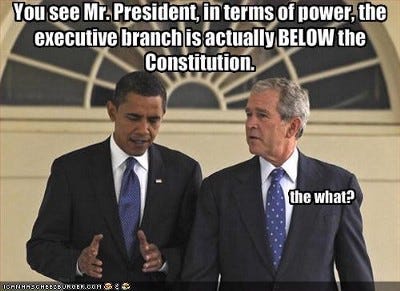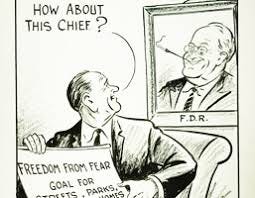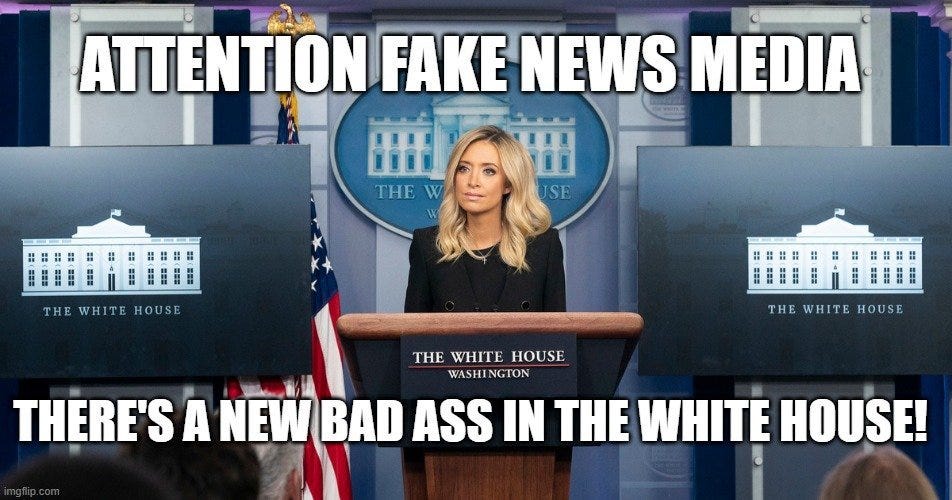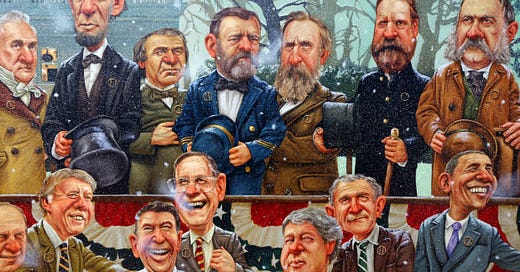A Benevolent Dictatorship with a Mix of Democracy #3
Are U.S. Presidents just dictators in the making?
Happy Monday (🤓) and welcome to the 3rd edition of the Pomegranate Seed!

Artist Zak Pullen created a 10-foot oil painting featuring all 43 presidents of the United States in his signature caricature style. Pullen, the winner of the 2014 Wyoming Governor's Arts Award, has launched a Kickstarter campaign for a 96-page book of his painting titled "The Presidents."
A bit of reflection and a reminder:
Critics who insist on pointing out the regular discrepancies between politicians’ claims and their true purposes are inevitably accused of fostering public cynicism.
These condemnations of cynicism, though, seem rather misguided. Perhaps members of the nation’s political class have reason to be concerned about cynicism.
Yet, cynicism alone is hardly an adequate guide to the reality of politics. Political cynics often see through the lies of the political class only to fall prey to even more bizarre fantasies.
Millions of Americans see over and over again that politicians and government officials routinely deceive, mislead and misinform them, offering pretexts while masking their true plans and purposes. This confuses every American citizen… we just don’t know what to believe in anymore.
But remember.. we only do optimistic takes here.
Instead, cynicism should be understood as a tool that can be used to objectively observe and respond to the realities of politics. Understanding of politics requires not only a willingness to reject falsehoods but also the ability to assess objective evidence and arrive at the truth.
A huge thank you to everyone who has signed up. Over 70 people have joined since last Monday! I kindly ask you to subscribe to The Pomegranate Seed.

Observing American politics and history without digesting the swing of power from the legislative branch to the executive branch would be erroneous. Aided through the cleverness of their lawyers and the influence to maintain the power within the elite, the Founding Fathers manufactured a complex but important functionality in the constitution:
separating administrative and legal authority through a system of representative democracy led by a President, an independent judicial branch appointed by the President, and the mighty engine which would be in charge all federal checks and balances- Congress.
Although Congress remains at the heart of the law-making process as the founders intended, the growth in size, visibility, and importance of the executive branch has undermined Congress’s role in the strategic capacities of the American government, particularly in foreign and military affairs.[1]
Congress is charged with the responsibility of declaring war, appropriating funds to the military, and approving treaties, yet Presidents have increasingly circumnavigated the need for Congressional checks- tipping the balance of power over to the executive branch.

Case Study: President Trump
Trump's interpretation of executive branches’ power is impossible to miss, but it’s not out of the norm.
Growing presidential privileges is for all intents and purposes growing with the increased working responsibilities in the advanced time.
So when Trump's calls for self-pardons and delay of the elections, this leads to another round of worries about the president's utilization of executive force, a large number of these worries are, to a limited extent, obvious.
But what’s most interesting is the way the president is choosing to flex his muscle compared with his predecessors. Past presidents have frequently tested the limits of their powers—and of the Constitution—on national security, war powers, and push-pull interactions with the legislature. But Trump seems to be pushing against the limits of his presidential power almost entirely to protect himself. (I will not go further on this topic)
The great struggle for Presidents is to define their actions in terms of a broader purpose that is coherent and consistent with the values of their supporters.
Since WW2, the legal need for Presidents to go to Congress regarding foreign or military affairs has dissipated. Presidents of the past began to apply equally fast action influence to affect non-mission-critical policies, such as social welfare, abortion, and immigration. This tinkering of authority and influence has extended the executive branch motifs as they spread their hold over every administrative and legal function the constitution explicitly and implicitly permits.
Before WW2 the environment of policy and politics had steadiness and an amount of endurance. However, an immediate change of Presidential rapport through 15 years post-V-J day, better known as “midcentury”, the environment of politics and policy is clouded with a sense of emergency!!!!!

Since 1945, countless state of affairs have been felt as crises inside government; there rarely has been comparable anxiousness outside government. In comparison with what was once normality, our politics has been unusual. [2]
The shattering of party loyalty, the prominence on persona, the militarization of world events, the naivety of public moods, and above the ticket-splitting, none of this was customary before the Second World War.
In 1787, the Founders kept the power to repel sudden attacks, “the world was a far larger place, and the framers probably had in mind attacks upon the United States.”[3]
Now the world had become smaller due to globalization. In brief, conflict anyplace on Earth could, if the President so mediated, constitute an attack on the United States and in so doing permits the president to wage “defensive war” [4] devoid of congressional consent. Under this philosophy, it is hard to see why any future President would ever see any legal need to go to Congress before leading the nation into war.
Many historians and observers of American politics identify the erosion of the checks on the Constitution towards President Lyndon Johnson’s boisterous inflation of presidential authority and his theory regarding “defensive war”. His eminent request for consensus was a matter of psychological need as well as of political strategy.[5]

Through repeated efforts to undermine Congress in aspects of military and foreign affairs, Johnson’s Great Society initiative marked the establishment of an expansion of the political power of the federal government centralization of administrative authority in Washington that had long been the dominion of local and state governments. This centralization had the result of damaging the need for separation of powers, making it difficult if not impossible for Congress, the president, and the bureaucracy to function amicably in pursuit of national interest. [6]
If Johnson construed himself more like a monarch than a customary leader of the Republican Party, his successor carried the inflation of presidential authority to a whole new level.
During the Vietnam War, President Nixon was able to convince Congress to get rid of multiple laws which governed Presidential authority, the assertion of select presidential authority now rested directly on the powers of the Commander in Chief, especially the power to do whatever necessary to protect American troops.
During the Nixon administration, when Congress and the Judicial Branch restructured itself to develop into a main participant in the administrative procedure, mainly due to the Watergate Scandal, the public agreement in support of limited government and stable budgets began to break down. The once vibrant, cynic, active, civic society of the ’60s & ’70s, began to become apathetic again. The US economy at the time had a lot to do with this apathy.
Moreover, Republican presidents, at times representing national majorities opposed to the enlargement of government, and Democratic Congresses, organized around private interests in support of its expansion, became rival forces to an extent irreconcilable. The consequence? Political gridlock is still plaguing the US till today.
It is no longer easy to understand the powers of government in terms of their use on behalf of a constitutional purpose.
Perhaps the biggest reason Congress is not able to meet its Constitutional role is due to executive overreach. The biggest impact of a strong executive branch is this idea of a winner takes all attitude evident in the negative campaigning that leads to political division. Instead of the president being a facilitator of party politics, it has created its own presidential politics which actively encourages cults of personality, making politics even more emotional and less rational than it already is. Skowronek and Ginsberg both illuminate the presidency as a fundamental force of upheaval and change. Skowronek insights have fundamentally altered our understanding of the American presidency. His “political time” thesis has been particularly influential, revealing how presidents reckon with the work of their predecessors, situate their power within recent political events, and assert their authority in the service of change. He also takes a fresh look at the impact of the twenty-four-hour news cycle, of a more disciplined and homogeneous Republican Party, of conservative advocacy of the “unitary theory” of the executive, and of progressive disillusionment with the presidency as an institution.[7]


Ginsberg also highlights how the use of media has propelled the executive branch in its ability to legitimize its extended power and force Congress to act. It is from here we see an interesting evolution of the executive’s power and reach.
Rather than being just authoritative in nature, we see the position of the president turn into one of leadership, persuasion, and authority.
The president is able to connect with the people on a much more personal level, inform them of the issues concerning the nation in real-time. This advantage is key in winning the support of the electorate.

It has become difficult to assess government, whether in the executive, the legislative, or judicial branches, in terms of their constitutional functionality.
In its place, we have obliged to critic the policymaking of the administrative state in terms of a defense of Congress, the presidency, or the Supreme Court, based mainly upon the policy prejudices of the citizen. More and more, congressional leaders and committees meet less to consider legislation. When Congress fails to act because it ties itself in congressional formalities and gridlock, The Presidents fill the void with “executive action”.
Legislative duties are now being done by executive agencies.
Congress has allowed partisanship to sour the objectivity of checks and balances in the first place.
Much of Congress only acts against abuse of executive power when it fits their own political agenda or an opportunity of pork bellying arrives.
A movement towards executive power is not necessarily an immediate threat to democracy since America’s current political environment resembles more like a parliamentary system, but, is a precursor to a potential partisan dictatorship that could arise if one political party is in charge of all three aspects of Government.

The farther we drift away from what the constitution is supposed to do, the more imminent is the threat to our Democracy…
Sources
[1] Neustadt, Richard E., and Richard E Neustadt. Presidential Power and the Modern Presidents: The Politics of Leadership From Roosevelt to Reagan. New York: Free Press, 1990.
[2] Schlesinger, Arthur M., Jr. (Arthur Meier), 1917–2007. The Imperial Presidency. Boston :Houghton Mifflin, 1973.
[3] Leonard C. Meeker, “The Legality of United States Participation in the Defense of South Viet-Nam,” March 4, 1966, reprinted in J. N. Moore, Law and the Indo-China War (Princeton, 1972),
[4] Schlesinger, Arthur M., Jr. (Arthur Meier), 1917–2007. The Imperial Presidency. Boston :Houghton Mifflin, 1973.
[5] Townsend Hoopes, The Limits of Intervention (New York, 1969), 145
[6] The Politics Of Budget Control: Congress, The Presidency And Growth Of The Administrative State, Taylor & Francis, 1992.
[7] Skowronek, Stephen. Presidential Leadership in Political Time: Reprise and Reappraisal, Lawrence, KS: University Press of Kansas, 2008, 22.
Blog/News Roll
I’ll be sharing a list of websites/people sharing extremely important information regarding Armenia. Expect this list to grow with every single publication.
DataArmenia
Armenian Military
Economist Intelligence Unit
EvnReport
Emil Sanamyan
Dr. Artyom Tonoyan
Dr. Aleksandr V. Gevorkyan
MFA of Artsakh
Artsakh / Karabakh Human Rights Ombudsman
__
Armenian Tech Landscape
From the creators:
The idea behind this board is to have the tech world in one place and maybe connect people 🙂 We have gathered all the tech companies here and will continue to crowdsource the gates for the tech landscape.
Why? We think it will be beneficial for the tech world:
For a software engineer trying to find an employer, for an investor looking to fund a startup or a stakeholder in search of a partner.



